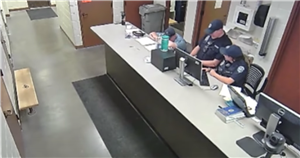Newly released video shows Colorado police officers laughing at footage of an arrest in which they allegedly injured a 73-year-old woman with dementia.
The hour-long video released Monday shows responding officers Austin Hopp and Daria Jalali of the Loveland Police Department and an unnamed third officer celebrating and laughing as they reviewed body cam footage of the arrest of Karen Garner, which happened last year.
“Ready for the pop?” officer Austin Hopp said, referring to moment when Hopp and Jalali place handcuffs on Garner on the side of the patrol car. “Hear the pop?”
The officer watching with them asked Hopp what popped, and he replied, “I think it was her shoulder.” Later in the footage, Hopp and the third officer exchange a fist bump as the video of the arrest played on.
Hopp said earlier in the video he was “proud” and “super excited” to use his hobble — a type of restraint police use — to hogtie the woman. In another moment, one of the officers referred to Garner as “ancient” and Hopp admits he didn’t read the woman her Miranda rights.
The officers arrested Garner after she exited a Walmart with more than $13 worth of merchandise that she had already returned, according to family attorney Sarah Schielke. Body cam footage of the arrest released earlier this month showed that Garner was forced to the ground multiple times and was hogtied on the side of a road.
Schielke said Garner’s arm was broken, her shoulder was separated and bruises covered her body following the arrest. Schielke claims Garner lost most functional use of her left arm and requires assistance to shower and get dressed as a result of the injuries she sustained during the arrest.
“They failed Karen Garner,” Schielke said in a statement on Monday. “They failed the community. And they did it all on camera.”
“Shame on you, Loveland,” she added. “You took an oath to protect and serve. This is a disgrace.”
Schielke has filed an amended civil lawsuit, saying the booking video shows the department knew Garner was injured. Loveland PD originally said they had not received a complaint regarding her injuries. Chief Robert Ricer told CBS Denver he was unaware of her injuries until he saw the lawsuit. The amended suit lists the department and five officers – two of whom were added Monday – as defendants. The lawsuit alleges officer Tyler Blackett and Sergeant Antolina Hill were “both aware of Ms. Garner’s injuries and need for medical treatment and personally complicit in the continued denial of that critical care.”
Loveland Police did not immediately respond to a CBS News request for comment. In a statement obtained by CBS Denver, police said all matters regarding Garner “are subject to a criminal investigation.”
“The District Attorney’s action and the third-party investigation are in keeping with a multi-agency Critical Incident Response Team protocol. Independent comment from the Loveland Police Department would not be appropriate at this time. LPD has faith in the due process that this investigation allows for,” the statement said.
Larimer and Jackson Counties District Attorney Gordon P. McLaughlin last week called for an independent criminal review into the incident. Loveland Police said in statement earlier this month that they are also investigating the incident. Hopp has been placed on administrative leave pending the outcome of the investigation. Jalali and the on-scene supervisor, Sergeant Phil Metzler, have been reassigned to administrative duties.
According to Schielke, Garner was not taken to the hospital for her injuries and was instead held for hours in a cell not far from where the officers were seen reviewing the footage. In addition to dementia, Garner suffers from sensory aphasia, which impairs her ability to verbally communicate and understand others’ communications, Schielke said.
The lawsuit also alleges violations of the Americans with Disabilities Act, stating that because of Garner’s mental disabilities, she “could not speak for herself or understand” Hopp’s intentions and the officers “failed to reasonably accommodate her disability.”
Source: Read Full Article





